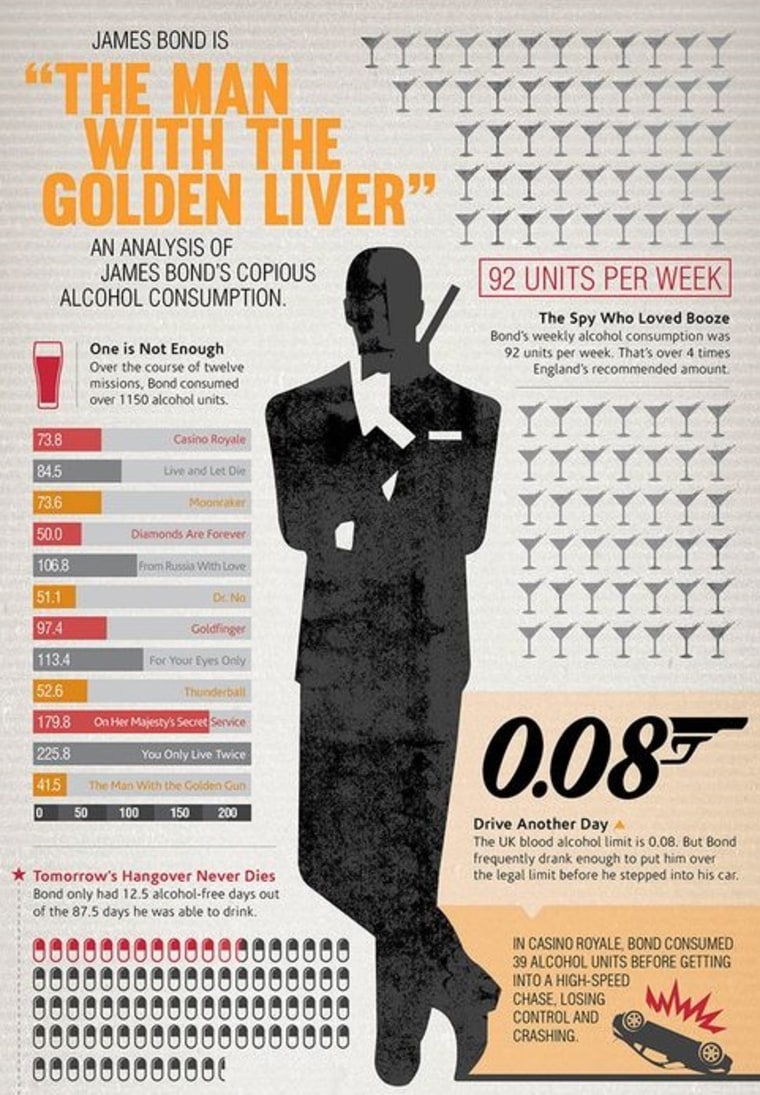James Bond was a fall-down drunk — "The Man With the Golden Liver" — according to real research published Thursday by real scientists.
In a paper (.pdf) in the December edition of BMJ (formerly the British Medical Journal), intensive care and liver specialists at the Nottingham University Hospitals NHS Trust concluded that Commander Bond was "in the highest risk group for malignancies, depression, hypertension, and cirrhosis."
If Bond's martinis were shaken, not stirred, it was probably because "Bond was unlikely to be able to stir his drinks, even if he would have wanted to, because of likely alcohol induced tremor," they noted. And forget about firing a gun accurately.
"He is also at high risk of suffering from sexual dysfunction, which would considerably affect his womanising," they added, spelling "womanizing" in the properly British way.
The researchers have a serious agenda, of course: to highlight the dangers of overconsumption of alcohol, which they reported is responsible for about 4 percent of all deaths worldwide.
And 007 — perhaps the world's most famous drinker — "has often been seen as a strong role model," they said, making him the ideal case study.
Related:
The research found that Bond's regular alcohol consumption averaged between 65 and 92 "alcohol units" a week. That's a standard medical measure used to quantify 10 milliliters of pure alcohol — roughly equivalent to a shot of 80-proof liquor.
In other words, Bond averaged 65 to 92 shots of hard booze a week — or nine to 13 a day.
On one particularly rowdy day, as described in "From Russia With Love," Bond had the equivalent of 50 drinks, the researchers calculated.
"Presuming survival despite the high risk nature of his profession, we anticipate that James Bond's life expectancy would be significantly reduced," they concluded — specifically, Bond should have been dead before he hit 60.
In "Casino Royale," Bond drinks more than 39 alcohol units right before getting in his car and starting a high-speed chase. He ends up crashing and spending 14 days in the hospital.
"We hope that this was a salutatory lesson," the researchers said.
"Although we appreciate the societal pressures to consume alcohol when working with international terrorists and high stakes gamblers, we would advise Bond be referred for further assessment of his alcohol intake and reduce his intake to safe levels," they said.
While presented lightheartedly, the research was quite rigorous.
Two of the study's authors read all 12 of Ian Fleming's full-length James Bond novels, noting every time Bond took a drink. (For purists, the researchers noted that there were 14 Bond books, but they excluded "Octopussy and the Living Daylights" because it's a collection of short stories and "The Spy Who Loved Me" because it's told in the first person by one of the characters — something literary scholars classify as an unreliable narrator.)
They then calculated how many times Bond had a pop on every day in the timeline of each story — cross-referencing for the number of alcohol units for beer and for each cocktail named. If standard recipes weren't available, they recreated each cocktail as best they could from Fleming's description and analyzed those.
(They didn't say what happened to those drinks afterward.)
And they even confessed that they'd neglected to cross all their ethical T's and dot all their ethical I's, dutifully noting:
"Ethical approval: The impact of this study on fictional British spies was thought to be minimal and therefore ethical approval was not sought for this study."
Related:
